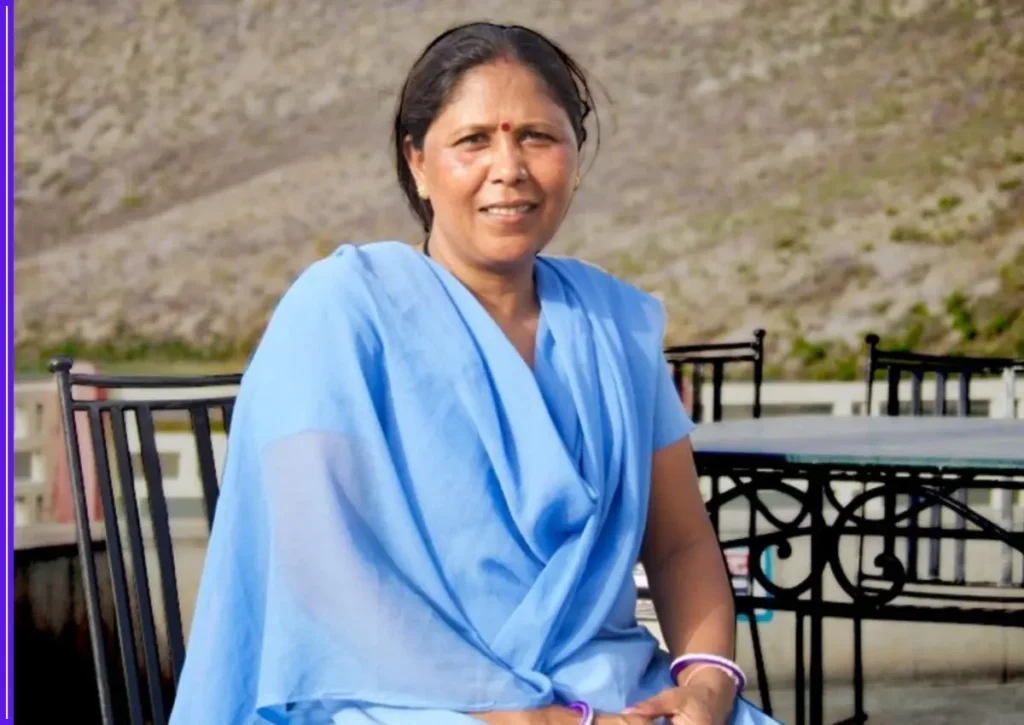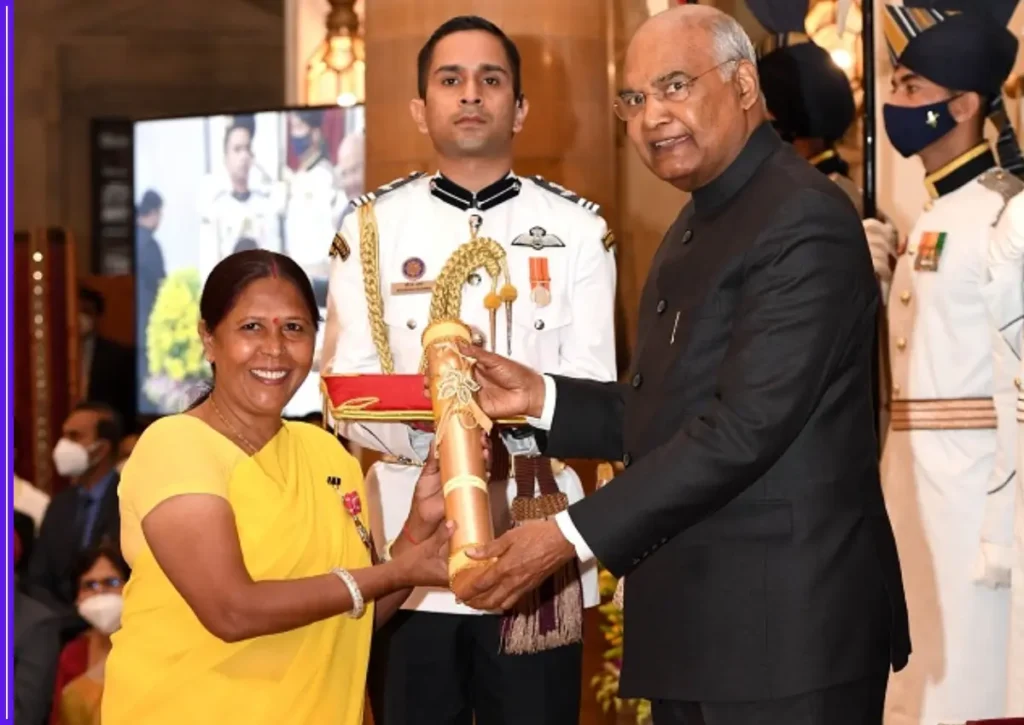There is never a wrong time or age to put on bravery and win the fights life throws our way, journey of Usha Chaumar from Rajasthan is evidence of this. Usha Chaumar has experienced such hardships in life, cleaning village toilets and carrying human waste on her head when she gets out of bed in the morning. Her life was forever altered when she joined the group known as “Sulabh International.” She is now the president of this group, which advocates for cleanliness and speaks out against manual scavenging. Today, Usha speaks for hundreds of these women.

Usha received recognition from Prime Minister Modi for her hygiene in 2015 as well. In 2020, she received the Padma Shri, India’s fourth-highest civilian honour, in recognition of her unwavering and altruistic efforts to increase cleanliness awareness.
The Employment of Manual Scavenging and Construction of Dry Latrines (Prohibition) Act was passed in 1993, outlawing the discriminatory practice, however some regions of India still allow manual scavenging.
Usha was born into a Dalit family
In the Rajasthani village of Deeg, close to Bharatpur, Usha was born into a Dalit family. At the young age of 7, she and her mother began manual scavenging. One had to travel around two kilometres distant to obtain water because there was no water connection within the residence. She was married off at the young age of 10 to an Alwar municipal sweeping employee. She became gauna after 4 years of marriage, or at the age of 14, and moved to live with her in-laws.
Life as Manual Scavenger
She had to help her mother-in-law and two sisters-in-law with the scavenging even at her in-laws’ home. She has no interest in doing this work. Who loves to clean up someone else’s messes, after all?
After getting home from work, there was no appetite for food. They had no other options, though. Water was also delivered to them from above if they ever felt thirsty because the members of their society used to practise a great deal of untouchability.
Even reaching out to touch someone was forbidden. If they accidentally touched someone, they were intimidated and called a variety of derogatory names. And was prohibited from purchasing items from the store. Even going to the temple was against the rules.
They received stale meals from someone’s house along with outdated clothes from their homes in exchange for this labour. 10 rupees were given to each household member in place of salary and were likewise thrown away. The males of the house used to clean, and the women of the family used to earn about 300 rupees every month.

Turning point
When she first met Dr. Bindeshwar Pathak, the creator of Sulabh International, in 2003, her life underwent a significant turn. Dr. Bindeshwar Pathak travelled to Alwar in order to make a positive change in the lives of manual scavengers. However, the circumstances at the moment meant that nobody was prepared to meet him.
When she was going to perform manual scavenging in the summer of 2003. The women who were with her were all covered in ghunghat, and Dr. Bindeshwar attempted to stop them both. She hesitated because she didn’t chat to other males and didn’t know who was making the unnecessary conversation.
They anticipated that a leader would speak about water and power. But what happened when Dr. Bindeshwar questioned her about why she was doing this task and how much she was being paid? She responded by saying that her ancestors had been carrying out this labour for years and couldn’t possibly stop.
However, although many women’s organisations refused to cooperate with them, women somehow managed to congregate in Mahal Chowk under the leadership of Usha. After more deliberation, a women’s organisation was established.
Joining Nai Disha
Usha began working for Dr. Bindeshwar’s company, “Nai Disha,” in Alwar, where she was paid Rs. 1500 per month. There were 28 ladies in the first group. There, they were assigned tasks such as creating jute bags, stitching, embroidery, lamp wicks, vermicelli, and papad. They received instruction in henna, beautician work, and tailoring.
She was also taught to read by the group. She picked up the English language, and now she has no trouble speaking in front of large crowds. The picture of Usha’s life today is quite different. She was set free from that life by the NGO Nai Disha of Sulabh International.
She had merged with the other Alwar women who were manually scavenging by 2010. These individuals’ income significantly increased as a result of their work.
Becoming a voice against Manual Scavenging
Now that Usha had gained notoriety as a speaker, she also spoke out against the practice of manual scavenging. She also served as an inspiration for women through her travels.
She has visited America, Paris, New York, South Africa, and London as a result of her job. And has met Prime Minister Narendra Modi numerous times. In 2017, she acquired the Vedic reading skills, and she also recited the Vedas in front of the Prime Minister.
The foreign model participated in a UN initiative under Mission Sanitation in 2008 while wearing clothes she had manufactured. There, the catwalk was performed by 36 women, including his sister-in-law and sister-in-law.
157 Alwar-based women manual scavengers’ lives were transformed by Usha Chaumar, who also helped them become independent. The women manual scavengers were forced to enter the Jagannath Temple at Subhash Chowk to the east on behalf of the Sulabh International organisation, and a group aarti was performed. Later, her colony also organised a large feast.
She was involved in the Varanasi Assi Ghat cleanup efforts. In 2015, she received a prize for her efforts from Prime Minister Narendra Modi. She was asked to speak about sanitation and women’s rights in India at the British Association of South Asian Studies’ (BASAS) annual conference.
As a special guest on the Kaun Banega Crorepati show, she was invited. She was also appointed as president of Sulabh International.
A life transformed
Usha’s spouse is a labourer who lives in the Alwar city neighbourhood of Hazuri Gate. They have three kids: a daughter and two sons. The boy works as a labourer with his father while the girl pursues her graduation. Usha is relieved that her offspring won’t have to perform this grubby task.
In the past, simply touching someone would have been considered a crime; however, people there invite them into their homes. She is especially welcomed during the wedding. She can now visit temples and offer adoration there.
Wrap-up
She was a woman who could never stand up for her rights, but now she represents the nation’s hundreds of manual scavengers. Usha has changed from being a helpless and untouchable lady to living a self-assured and respectable life. She is the epitome of women’s empowerment.
Usha Chaumar is a living example of the strength of tenacity and willpower today. Her story serves as a reminder that despite seemingly insurmountable obstacles, one may rise above them, triumph, and exert constructive change. She has dismantled the prejudices that formerly confined her in addition to escaping the bonds of her past.









